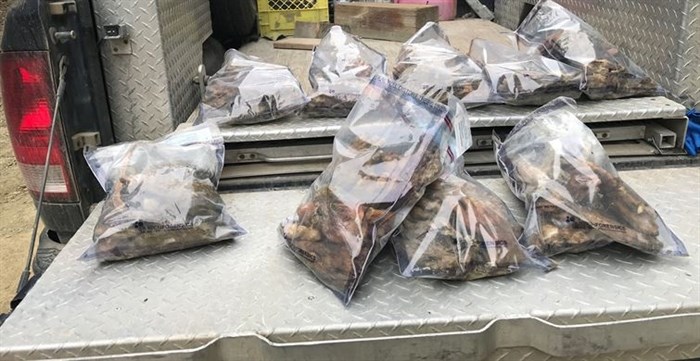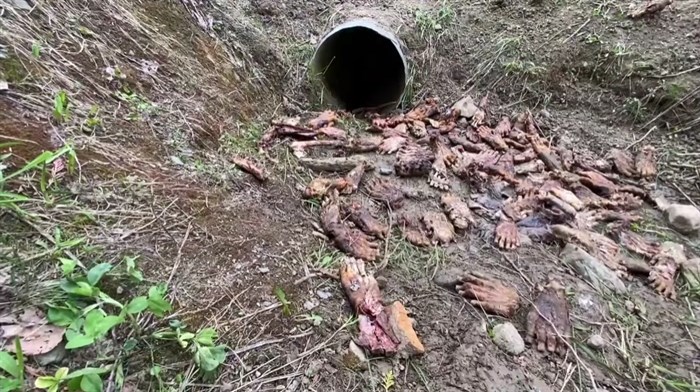
The B.C. Conservation Officer Service said a taxidermist was responsible for dozens of bear paws strewn on a Shuswap forest road in May 2021.
Image Credit: TWITTER/B.C. Conservation Officer Service
September 15, 2022 - 4:26 PM
More than a year after dozens of skinned and discarded bear paws were found on a forest road near Little Shuswap Lake, the B.C. Conservation Officer Service has finished its investigation and determined the person responsible for the strewn animal parts was a taxidermist, who was "lawfully in possession" of the paws.
Brandi Hansen spotted them along a forest service road where they were laying across the road and in a nearby culvert.
"I come from a family of hunters and I have been hunting since I was a child, yet never have I witnessed anything of this caliber," she said in a social media post in May 2021. It first appeared to Hansen the remains might have been left by a taxidermist, but the presence of cub paws, skulls and the irresponsible dumping in a waterway lead her to believe it was a poacher.
The conservation officer service said it wasn't a poacher and, if not for a donation to the local First Nation, that person would have seen only a $115 fine for littering. Although it did not say how much, the donation "far exceeds" the potential fine for littering.
"The waste was unlawfully dumped after it inadvertently fell out of the back of the individual’s truck while travelling," the conservation officer service said in a media release.

Dozens of bear paws found near Anglemont Mountain were scattered on the road and near a culvert.
Image Credit: Facebook/Brandi Hansen
The taxidermist was cooperative with conservation officers and made a donation to the Little Shuswap Lake Band's Watershed Steward Ship Guardian Program.
The conservation service said the incident is not linked to any black market operations trafficking bear parts.
“We understand the public is passionate about wildlife and recognize this scene was alarming and concerning to many Indigenous communities, British Columbians and others,” acting chief conservation officer, Cam Schley, said in release.
“We hope the conclusion of this investigation, which confirms this was not related to poaching, helps alleviate distress and bring closure to the public.”
To contact a reporter for this story, email Levi Landry or call 250-819-3723 or email the editor. You can also submit photos, videos or news tips to the newsroom and be entered to win a monthly prize draw.
We welcome your comments and opinions on our stories but play nice. We won't censor or delete comments unless they contain off-topic statements or links, unnecessary vulgarity, false facts, spam or obviously fake profiles. If you have any concerns about what you see in comments, email the editor in the link above.
News from © iNFOnews, 2022